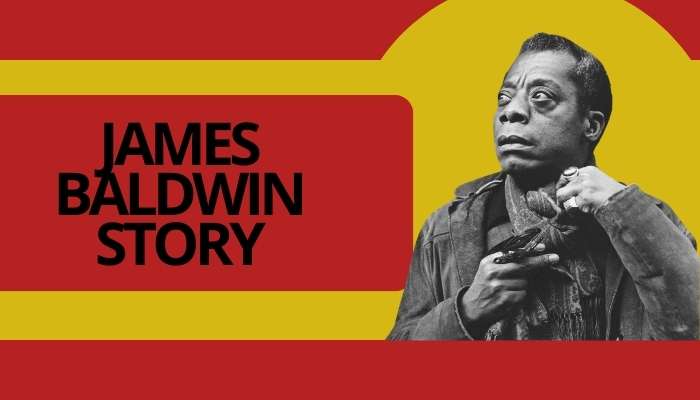Today, we’ll look at the James Baldwin Gay story and a lot more. Let’s dive in.
For the first time in his career, novelist James Baldwin openly identified with the Gay community by addressing more than 200 persons at a forum sponsored by The New York Chapter of Black and White Men Together (BWMT-NY).
The forum was held June 5 in the Gay synagogue known as Simchat Torah on the West side of Greenwich Village. Speaking with candor and openness about his own homosexuality, Baldwin claimed that his life-long sexual orientation had never been a secret, but he had not always felt it was necessary, “or anybody’s business,” to openly affirm it. “
Before I was seven years old,” he said, “there were so many labels on my back beginning with ’nigger.’
By the time I was 14, I went through a kind of nervous breakdown, which happened when I was a preacher and by the time I was 17, I had survived all the labels, including the label of ‘faggot.’
It wasn’t and it isn’t easy.”
Baldwin briefly mentioned his becoming a Pentecostal minister in Harlem as a youth, and then declared, “I still consider myself a Christian,” although he was careful to point out that he did not necessarily identify with institutionalized Christianity. Similarly, he explained that, while he is Gay, he does not necessarily identify with all of the institutionalized and “ghettoized” Gay community.
Also Read: Homophobia in the Black Community: The Ultimate Guide!
A Revolutionary Voice of His Time
James Baldwin, an illustrious figure whose legacy continues to echo through our contemporary dialogues around race and sexuality, never shied away from the tough conversations.
This candidness turned him into a luminary for both Black and LGBTQ+ communities. Today, we explore Baldwin’s evolution as an openly gay advocate, his perspective on racism within the gay community, and how it all shaped his profound body of work.
Baldwin on ‘Mercantile Morality’
“The morality of the marketplace,” Baldwin declared, lamenting what he saw as a commodification of identity politics.
This wasn’t a critique limited to a political party, but extended to the gay community as well. His words might provoke a knee-jerk reaction, but they also compel us to reconsider our own roles within the societal framework.
Questioning the Moral Authority of White Culture
Challenging the established norms, Baldwin, without mincing his words, noted that white folks “are morally bankrupt”.
Even the revered humanist thinkers and existentialists, many of whom he personally knew, weren’t spared his candid criticism. Are we ready to scrutinize our belief systems and re-examine the philosophical icons we revere?
Also Read: The Civil Rights Song Played by a Different Band: A Look at White Power Tripping
Racism in the Gay Community: Reflecting a Larger Societal Issue
In Baldwin’s view, gays, like Blacks, were being victimized by society’s fear of the ‘other’. He posited that white gay individuals exemplify the same racist attitudes inherent in the wider society.
One striking example was his encounter with renowned gay writer Gore Vidal’s derogatory remark. What does this say about our attitudes within the spheres we consider progressive?
Also Read: Black People Statistics You Probably Didn’t Know About!
Baldwin’s Evolution as a Gay Advocate
Baldwin’s journey as an openly gay advocate was an evolution, rather than a sudden transformation. The spark was his groundbreaking work, “Giovanni’s Room”, a personal catharsis that gave voice to his experience.
Now, Baldwin’s later works such as “Just Above My Head” feature openly gay Black characters, unapologetically showcasing their experiences.
Also Read: Unraveling the Story of NCBLG: An Oasis for Black Queerness
Rejecting Societal Delusions of ‘Normal’
Baldwin insisted, “One has to reject, in toto, the implication that one is abnormal.” This is a societal delusion, according to him, that has no truth. A potent reminder that we shouldn’t let societal constructs define us, but instead, celebrate our unique identities.
Also Read: The National Coalition of Black Lesbians and Gays: The Ultimate Guide!
Your Turn: A Legacy of Empowerment
Baldwin’s incisive views, his critique of racism, and his candid portrayal of his sexuality have made him an enduring figure in cultural and social studies. As we revisit his work, we’re reminded of the continued relevance of his message today.
His words continue to challenge, inspire, and empower. Let’s take a leaf from Baldwin’s book and embrace the unique individuals we truly are, unapologetically.
This blog post isn’t merely about analyzing Baldwin’s stance. It’s about igniting conversations, encouraging self-reflection, and, ultimately, inspiring change. Baldwin’s story isn’t just history; it’s a reminder that the struggle for acceptance and equality is ongoing. By engaging with his story, we take a step closer to understanding and promoting equality for all.
Did you enjoy this journey through Baldwin’s thoughts and experiences? Feel free to share, comment, and keep this crucial dialogue going.
Also Read:
- Starter Dreads: Everything You Need to Know!
- 50+ Hot Dreadlock Hairstyles for Modern Women
- Why do Black Girls Wear Wig? The Pros and Cons
- Why Do Black People Have Yellow Eyes? The Ultimate Guide!
- Can Black People Have Blue Eyes? Everything You Need to Know!
- Why do Black People Have Big Lips? Everything You Need to Know!
- Silenced Rhythms: Unmasking the Intersection of Race and LGBTQ+ Life in Cuba
